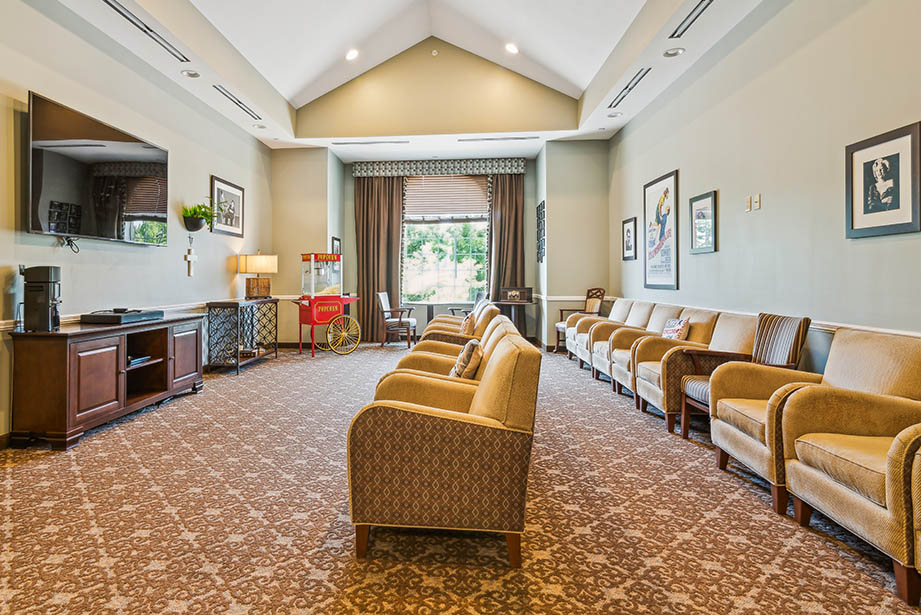When a loved one needs extra support, families often consider assisted living or memory care. Both provide professional care in a community setting, but serve different needs.
Assisted living is designed for seniors who require assistance with daily tasks, such as bathing, dressing, or taking medication, while still maintaining their independence. Memory care is designed for those with Alzheimer’s or dementia, offering specialized support and safety.
Understanding the differences can help you select the most suitable option for your loved one’s needs and well-being.
What Is Assisted Living?
Assisted living provides a supportive environment for adults who require assistance with daily activities but don’t need the intensive medical care of a nursing home. This lifestyle bridges the gap between independent living and more comprehensive care options.
Services & Support in Assisted Living
Assisted living communities typically offer assistance with activities of daily living, including bathing, dressing, medication management, and mobility support. Professional staff members are available around the clock to provide help when needed while respecting each resident’s independence.
Some communities also provide housekeeping, laundry services, and maintenance support, allowing residents to focus on the activities and relationships they value.
Benefits of Assisted Living
The assisted living lifestyle removes the burden of home maintenance while preserving personal autonomy. Residents can maintain their routines and preferences while receiving the support they need to live safely and comfortably.
Social connection opportunities, including community dining, scheduled experiences, and wellness programs, help residents stay engaged and active within a supportive environment.
What Is Memory Care?
Memory care is a specialized lifestyle designed for individuals living with Alzheimer’s disease, dementia, and other memory-related conditions. These communities offer a secure environment with staff trained in specialized memory care approaches.
Services & Support in Memory Care
Memory care communities offer 24-hour supervision and assistance tailored to the unique needs of residents with cognitive conditions. Staff members receive specialized training to understand and respond to the behaviors and challenges associated with memory loss.
These communities typically feature secure environments designed to prevent wandering while creating a comfortable, homelike atmosphere. Programming focuses on maintaining cognitive function and supporting each resident’s remaining abilities.
Assisted Living vs. Memory Care
Understanding the key differences between these lifestyles can help guide your decision.
1. Accommodations & Services
Assisted living offers more independence and flexibility in daily routines. Residents typically have private or semi-private apartments and are free to come and go as they please.
Memory care offers a more structured environment with specialized accommodations designed for safety and orientation. These spaces are often carefully designed to reduce confusion and support navigation.
2. Staff Training
Assisted living staff receive training in general care assistance and emergency response. They focus on supporting residents while maintaining their dignity and independence.
Memory care staff undergo specialized training in dementia care, behavior management, and communication techniques specific to memory-related conditions.
3. Security Measures
Assisted living communities typically have standard security measures similar to those found in other residential communities.
Memory care communities feature enhanced security systems, including secured entrances and exits, to ensure resident safety while maintaining a comfortable living environment.
4. Activities & Programs
Assisted living communities offer diverse programming tailored to match a wide range of interests and abilities. Residents can choose which experiences to participate in based on their preferences.
Memory care programming focuses on cognitive stimulation, routine establishment, and activities designed to support memory function and reduce anxiety.
5. Level of Supervision
Assisted living provides support as needed while encouraging independence. Staff check on residents regularly, respecting their privacy and personal space.
Memory care provides continuous supervision and monitoring, with staff trained to recognize and respond to the evolving needs of residents with cognitive impairments.
6. Cost Considerations
Assisted living typically costs less than memory care due to the different levels of specialized care and supervision required.
Memory care involves higher costs due to specialized staff training, enhanced security measures, and the individualized attention required for residents with memory-related conditions.
Summary of Key Differences

Choosing between assisted living and memory care can be tough, as both offer professional care and a sense of community. However, they meet different needs based on the level of support required.
- Assisted Living:
- Supports independence with some assistance.
- Assists with daily tasks such as bathing, dressing, and medication administration.
- Encourages social and recreational activities.
- Memory Care:
- Designed for individuals with Alzheimer’s or dementia.
- Staff specialize in managing cognitive challenges.
- Provides a secure, structured environment with added safety.
- Offers programs to stimulate memory and cognitive function.
Both options are compassionate and tailored to residents’ needs. The key difference is that assisted living supports general daily activities, while memory care provides specialized care for individuals with memory-related conditions. Understanding these differences can help you choose the best fit for your loved one.
How to Determine the Care Level Your Loved One Needs
Choosing the proper care option for your loved one starts with understanding their abilities and safety needs. Whether they require occasional assistance or specialized support, there are options tailored to meet their specific needs.
- If they manage most daily tasks independently but need some assistance, assisted living offers a balance of support and autonomy.
- For those with Alzheimer’s, dementia, or other memory-related conditions, memory care provides a safe, specialized environment and expert care.
Consulting healthcare professionals, including their physician, can help determine the appropriate level of care for both the present and the future. Taking the time to evaluate these options ensures your loved one receives the proper care to support their safety, health, and overall well-being.
Finding the Right Care, Every Step of the Way
The Enclave of Scarborough knows that choosing the right senior care option is a vital decision that impacts your loved one’s quality of life and peace of mind. Whether it’s assisted living, memory care, or another specialized service, taking the time to assess their unique needs and preferences ensures they receive compassionate support and a nurturing environment.
Contact us today to learn more about how assisted living or memory care can benefit your loved one, so we can help provide you with a solution that honors their dignity while supporting their health and happiness.









